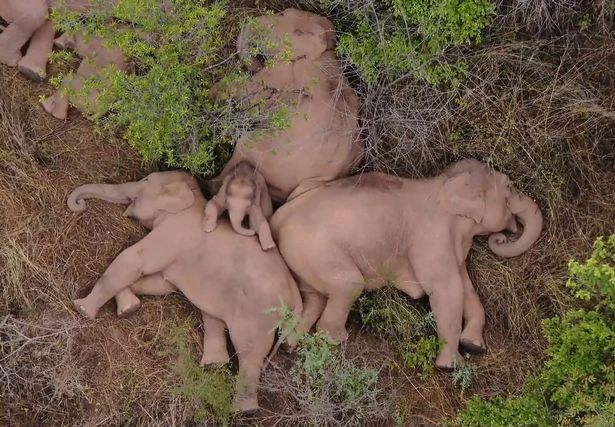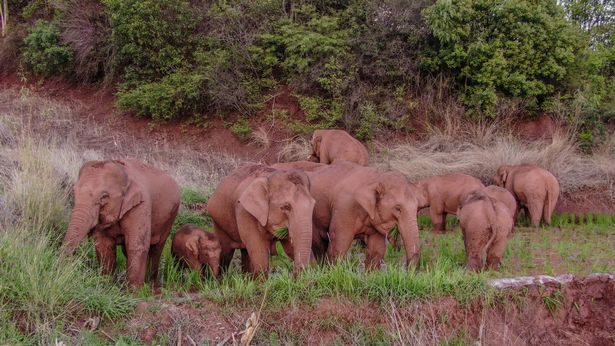A rebellious herd of elephants responsible for ransacking two cities on a march across China have been spotted taking a nap together.
An aerial photo shows three adults in a protective triangle around a calf, while others appear to be spooning each other as they doze after months of chaos.
The herd has headed more than 300 miles across the country’s south west over the course of more than year after fleeing a national nature reserve in March 2020.
Their motivation for leaving and where exactly they’re going has baffled experts but their trek has included them gaining access to fermented grain in Mojiang County, which got them drunk.

(Image: CCTV/AFP via Getty Images)
The session saw two so inebriated they couldn’t continue, while the rest of the herd went on to storm the streets of Yuxi City in Yunnan.
For six hours, they rummaged through bins, bashed garage doors and forced thousands of people to flee their homes.
One even turned on an outside water tap so the whole herd could get a drink.
It’s estimated the elephants have caused more than £1 million worth of carnage, including destroying 60 hectares of crops.
Earlier this month the herd entered Jinning District and marched on the state capital of Kunming, home to eight million people.
As a result, 400 police officers were deployed to help put out 18 tons of corn, pineapples and other food in the hope of stopping them.

(Image: Xinhua/REX/Shutterstock)
But after polishing off the feast, the herd marched on.
Chen Mingyong, a professor at Yunnan University, has suggested the matriarch of the herd might be “lacking in experience”, meaning she led the whole group “astray”.
He added: “We have no way of telling where they are going.”
The convoy left their long-standing home at a reserve in Xishuangbanna in China’s mountainous south west near the border with Laos and Burma, on March 15 last year.

(Image: Xinhua/REX/Shutterstock)
At that point the herd was 16-strong and a month later two calves were born, before one adult left the group.
In December, two had got so drunk on the fermented grain they also were forced to drop out of the trek, meaning their number is down to 15.
Images of the herd sleeping were taken in Xiyang, due north of Kunming.
It has been speculated that the herd were tempted to leave their home by availability of more appealing cultivated crops, with their diet previously consisting of grass, leaves and tree bark.
Leading conservationist at London Zoo, Becky Shu Chen, said an increase in deforestation since the 1980s means elephants habitats are being increasingly disturbed.
She said while it is normal for herds to roam large areas looking for food, they are not migratory animals and trekking 300 miles is unprecedented.


